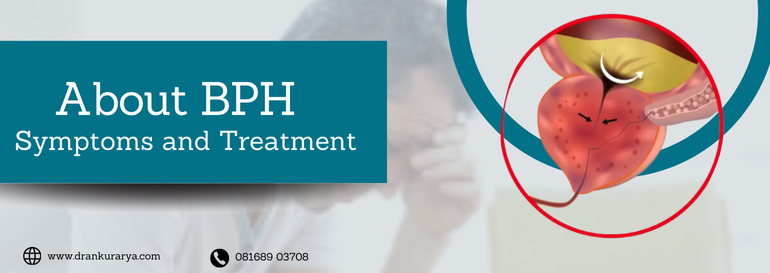Office Address
142, Avtar Enclave, Paschim Vihar, Delhi, 110063
142, Avtar Enclave, Paschim Vihar, Delhi, 110063

Benign Prostatic Hyperplasia (BPH), commonly known as an enlarged prostate, is a condition that affects many men as they age. While it's not life-threatening, BPH can significantly impact the quality of life, causing uncomfortable symptoms that can disrupt daily activities. In this blog, we will explore what BPH is, its symptoms, and the available treatment options.
What is BPH?
BPH occurs when the prostate gland, which surrounds the urethra, enlarges and starts to block the flow of urine. This condition is common in men over the age of 50 but can also develop earlier. Unlike prostate cancer, BPH is non-cancerous, but it can still lead to serious complications if left untreated.
The symptoms of BPH are often related to the urinary system, as the enlarged prostate presses against the urethra and bladder. Common symptoms include:
Frequent Urination: You may feel the need to urinate more often, especially at night (nocturia).
Difficulty Starting Urination: A delayed or weak urinary stream can occur.
Incomplete Bladder Emptying: You may feel like you haven't fully emptied your bladder, even after urinating.
Urgency: A sudden, strong need to urinate.
Dribbling at the End of Urination: Weak urine flow or stopping and starting during urination.
If you are experiencing any of these symptoms, it is essential to consult with the best urologist doctor in Paschim Vihar for a proper diagnosis and management plan.
The exact cause of BPH is unknown, but it is believed to be linked to hormonal changes that occur with aging. Testosterone and estrogen levels may shift, causing the prostate to grow larger. Genetics may also play a role, meaning that if a close relative has had BPH, you might be at higher risk.
There are several treatment approaches available for BPH, ranging from lifestyle changes to medication and surgery. Consulting with the best urologist doctor in Paschim Vihar will help determine which treatment is most appropriate for you, depending on the severity of your condition.
1. Lifestyle Changes
In mild cases of BPH, simple lifestyle modifications may alleviate symptoms. These include:
2. Medications
Several medications are available to manage BPH symptoms. Common options include:
Alpha-blockers: These relax the muscles in the prostate and bladder neck, making it easier to urinate.
5-alpha reductase inhibitors: These medications help shrink the prostate by reducing hormone production that causes prostate growth.
Combination therapy: In some cases, a combination of the above medications is used for better symptom control.
3. Minimally Invasive Procedures
If medication isn't effective, minimally invasive procedures may be recommended to reduce prostate size and relieve symptoms. These procedures include:
Transurethral resection of the prostate (TURP): A common surgery where part of the prostate is removed to ease urinary flow.
Laser therapy: High-energy lasers are used to remove or shrink prostate tissue.
UroLift: A procedure that uses implants to hold the enlarged prostate away from the urethra.
4. Surgery
For severe cases, surgery may be necessary. Prostatectomy, the complete or partial removal of the prostate, can be performed to provide long-term relief from BPH symptoms. Consulting the best urologist doctor in Paschim Vihar will help you understand the risks and benefits of surgical options.
While BPH symptoms can be bothersome, they are not always an immediate cause for concern. However, if you notice any of the following signs, it’s crucial to seek medical advice:
BPH is a common condition that many men will experience as they age, but the good news is that effective treatments are available. From lifestyle changes to medications and surgical options, managing BPH is possible. If you are experiencing any symptoms of an enlarged prostate, don’t hesitate to consult the best urologist doctor in Paschim Vihar to find the right treatment plan for you.